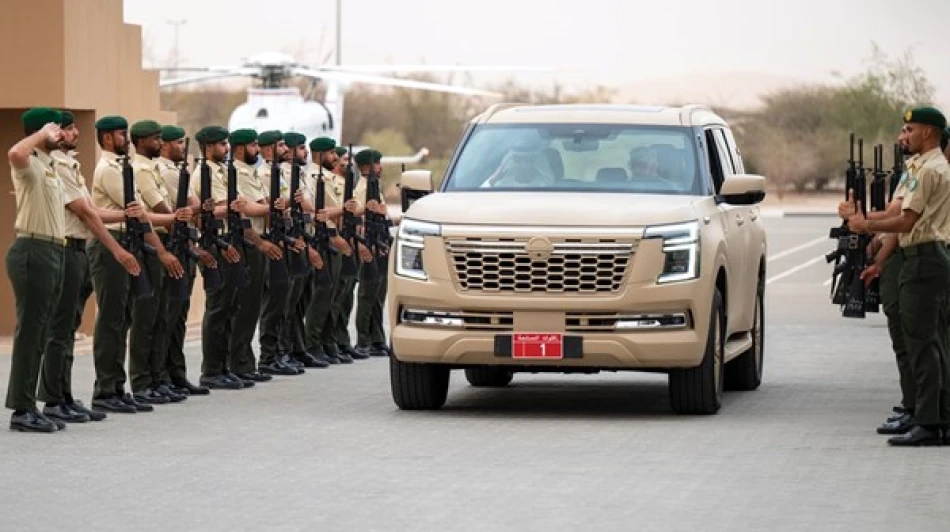
Hazza bin Zayed Attends Specialized Demonstrations by National Service Recruits
UAE National Service Graduates 22nd Batch as Military Preparedness Takes Center Stage
The United Arab Emirates has completed training for its 22nd batch of national service recruits, marking another milestone in the country's systematic approach to building military readiness and national resilience. The graduation ceremony, attended by senior UAE leadership, showcased advanced combat skills and highlighted the program's role in preparing citizens for both defense duties and broader national development goals.
High-Level Recognition for Military Excellence
Sheikh Hazza bin Zayed Al Nahyan, the Ruler's Representative in Al Ain region, presided over the graduation ceremony at the Saih Al Lahma Training Center. The event drew significant military leadership, including Major General Ibrahim Nasser Mohammed Al Alawi, Deputy Minister of Defense, alongside senior defense ministry officers and families of the graduating recruits.
The ceremony featured comprehensive military demonstrations, including combat exercises, infantry formations, and coordinated group maneuvers. These displays demonstrated the recruits' physical fitness and advanced military capabilities, reflecting the program's success in preparing citizens for national defense responsibilities.
Strategic Vision Behind National Service
Building Tomorrow's Leaders
Sheikh Hazza emphasized the national service program's broader mission beyond military training, describing it as essential for developing competencies and preparing a generation capable of leading the country's future development. This approach aligns with President Sheikh Mohamed bin Zayed Al Nahyan's vision of comprehensive citizen engagement in the UAE's ongoing progress and modernization.
The program serves dual purposes: strengthening the armed forces with qualified personnel while enhancing the capabilities of national institutions across sectors. This model reflects the UAE's understanding that modern security challenges require citizens equipped with both military skills and broader professional competencies.
Regional Context and Comparison
The UAE's national service program, established in recent years, represents part of a broader regional trend toward mandatory military service. Unlike traditional conscription models, the UAE system emphasizes skills development and national identity building alongside military preparedness. This approach mirrors successful programs in countries like Singapore, where national service contributes to both defense capabilities and social cohesion.
The program's structure addresses the unique challenges facing Gulf states, where small populations require efficient systems for building defense capabilities while maintaining economic growth momentum. By integrating military training with broader skills development, the UAE maximizes the return on its national service investment.
Implications for National Security Strategy
Building Resilient Defense Capabilities
The graduation of the 22nd batch demonstrates the program's maturation and systematic approach to building defense capabilities. The emphasis on both combat readiness and institutional development suggests the UAE views national service as integral to comprehensive security strategy rather than merely military preparation.
This approach becomes particularly significant given regional security dynamics and the UAE's position as a major economic hub requiring robust protection of critical infrastructure and commercial interests. The program ensures a steady pipeline of trained personnel familiar with both military protocols and civilian sector needs.
Economic and Social Dimensions
The national service program's focus on skills development creates value beyond military preparedness. Graduates enter the workforce with enhanced discipline, leadership experience, and technical capabilities that benefit the broader economy. This multiplier effect justifies the program's costs while contributing to the UAE's human capital development objectives.
The program also strengthens social cohesion by bringing together citizens from diverse backgrounds in shared national service. This aspect becomes increasingly important as the UAE continues diversifying its economy and integrating various communities within its national framework.
Future Trajectory and Expectations
The success of the 22nd batch indicates the UAE's commitment to maintaining and expanding its national service capabilities. The program's evolution reflects broader trends in modern military preparation, where traditional combat training integrates with technological skills and institutional knowledge.
As regional security challenges evolve and the UAE's global economic role expands, the national service program provides a foundation for adaptive response capabilities. The emphasis on both loyalty to leadership and technical competence suggests the UAE views this program as essential infrastructure for long-term national success rather than a temporary security measure.
Most Viewed News

 Layla Al Mansoori
Layla Al Mansoori






